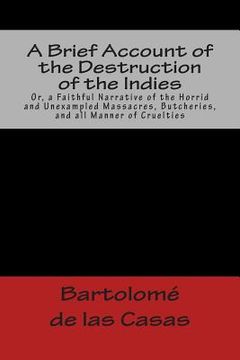A Brief Account of the Destruction of the Indies Or, a Faithful Narrative of the Horrid and Unexampled Massacres, Butcheries, and all Manner of Cruelt (en Inglés)
Reseña del libro "A Brief Account of the Destruction of the Indies Or, a Faithful Narrative of the Horrid and Unexampled Massacres, Butcheries, and all Manner of Cruelt (en Inglés)"
Few people read the full account of De Las Casas. Frequently this piece is referenced in excerpts in anthologies. However, should the reader want an authentic and direct account of the real events of the Spaniards' treatment of native peoples of the Carribbean and elsewhere, this is the narrative. This can be read in one sitting, and is clearly the work of an informed and intelligent writer. Some extremity of language is apparent, and the author's bias can be seen on nearly every page. For history junkies, this is a wonderful read. Bartolomé de Las Casas, born in 1474, came to Cuba with Diego Velázquez's expedition in 1511 as a soldier. In Cuba, he became an "encomendero", receiving Indian labor parceled out to the conquistadors. The horrors of the conquest of the Caribbean sparked a religious conversion in him and he became a Dominican friar in 1515. Soon, he made his way to the Central American mainland, where he started missionary work among the Maya in Guatemala. Dubbed later "The Apostle to the Indians" for his work on their behalf, he was eventually appointed Bishop of Chiapas. An intimate friend of the Indians, fluent in their languages, Las Casas witnessed Spanish cruelties perpetrated against them between the very year of his arrival and some years before his death in Spain in 1566. In 1552, Las Casas published his empassioned "Short Account" (actually written 13 years earlier), in which he laid bare Spanish cruelties in America. Though generally condemned as slander in Spain, the book rapidly became popular in the rest of Europe, where it served to fuel anti-Spanish hate. Spain's enemies used it to depict Spaniards as evil tyrants and to rationalize carving out their own empires in the Americas. New editions appeared repeatedly, even as late as 1898, during the Spanish-American War. Few credible historians take the "Account" for gospel truth. Much of what Las Casas says is certainly true. And while the rest is exaggerated, it is not "propaganda". Whatever truth the narrative has, though, many people miss its importance in understanding the Spanish Black Legend. The Black Legend is the perception of Spain as a uniquely cruel and bigoted nation in excess of reality. Spanish culture is boiled down to the Inquisition and the bullfight. Spain's authors are ignored. The Spanish did nothing in the Americas but kill millions of Indians. This is the legacy of the 16th century. The substance of many European attitudes toward Spain up to about 1950 can be traced right to Las Casas' "Account." Appearing at the time when England and the Netherlands were emerging as major powers, grappling with Spain, the imagery from the book was woven right into their national mythologies. Because of historical circumstance, other nations that committed atrocities far worse than Spain's -- France, Britain, the United States -- never had to undergo the same humiliating scrutiny, the same alienation. Las Casas's book, certainly against its author's will, helped shape this. The account's real value is the key it offers to understanding Western perceptions of Spain. Like so many anti-Spanish documents of its time, the book, in the end, can tell us as much about the fascinating figure of its author and the character of Spain's enemies as about the horrors of the conquest and the nation it vilifies.

